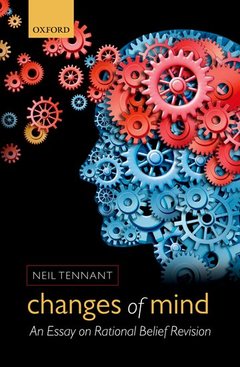Changes of Mind An Essay on Rational Belief Revision
Langue : Anglais
Auteur : Tennant Neil

This is the first logically precise, computationally implementable, book-length account of rational belief revision. It explains how a rational agent ought to proceed when adopting a new belief - a difficult matter if the new belief contradicts the agent's old beliefs. Belief systems are modeled as finite dependency networks. So one can attend not only to what the agent believes, but also to the variety of reasons the agent has for so believing. The computational complexity of the revision problem is characterized. Algorithms for belief revision are formulated, and implemented in Prolog. The implementation tests well on a range of simple belief-revision problems that pose a variety of challenges for any account of belief revision. The notion of 'minimal mutilation' of a belief system is explicated precisely for situations when the agent is faced with conflicting beliefs. The proposed revision methods are invariant across different global justificatory structures (foundationalist, coherentist, etc.). They respect the intuition that, when revising one's beliefs, one should not hold on to any belief that has lost all its former justifications. The limitation to finite dependency networks is shown not to compromise theoretical generality. This account affords a novel way to argue that there is an inviolable core of logical principles. These principles, which form the system of Core Logic, cannot be given up, on pain of not being able to carry out the reasoning involved in rationally revising beliefs. The book ends by comparing and contrasting the new account with some major representatives of earlier alternative approaches, from the fields of formal epistemology, artificial intelligence and mathematical logic.
1. Introduction. Part I: Computational Considerations. 2. Computing Changes in Belief. 3. Global Conditions on Contraction. 4. A Formal Theory of Contraction. 5. Specification of a Contraction Algorithm. 6. A Prolog Program for Contraction. 7. Results of Running our Program for Contraction. Part II: Logical and Philosophical Considerations. 8. Core Logic is the Inviolable Core of Logic. 9. The Finitary Predicament. 10. Mathematical Justifications are Not Infinitely Various. Part III: Comparisons. 11. Differences with Other Formal Theories. 12. Connections with Various Epistemological Accounts.
Neil Tennant holds a BA in Mathematics and Philosophy, and a PhD in logic, from the University of Cambridge. His researches in Logic and Philosophy of Science have been supported by the British Academy, the Alexander von Humboldt Foundation, the Australian Research Council, and the National Endowment for the Humanities. He has held chairs in Philosophy at the University of Stirling and the Australian National University, and visiting professorships or fellowships at Dartmouth College, the University of Michigan, the Pittsburgh Center for Philosophy of Science, The ANU Institute for Advanced Studies, and Churchill College, Cambridge. He is currently Arts & Humanities Distinguished Professor in Philosophy at The Ohio State University.
Date de parution : 06-2012
Ouvrage de 364 p.
16.4x24.2 cm
© 2024 LAVOISIER S.A.S.



